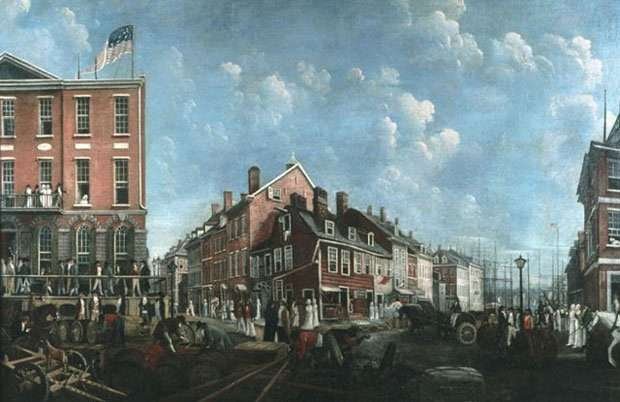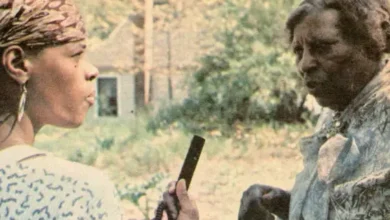Merchant’s Coffee House at the Outbreak of the Revolution


 Nesbitt Deane, the hatter, whose shop was in the old Merchants’ Coffee House building in the city of New York, advertised in 1775, to let the two or three upper stories of the house, “being noted for a Notary Public’s office these two years past,” which he further describes “as being so pleasantly situated that a person can see at once the river, shipping, Long Island and all the gentlemen resorting to the House on business from the most distant climes.”
Nesbitt Deane, the hatter, whose shop was in the old Merchants’ Coffee House building in the city of New York, advertised in 1775, to let the two or three upper stories of the house, “being noted for a Notary Public’s office these two years past,” which he further describes “as being so pleasantly situated that a person can see at once the river, shipping, Long Island and all the gentlemen resorting to the House on business from the most distant climes.”
Although the Coffee House was generally the resort of strangers as well as citizens, yet, in 1775, on account of the stagnation of business caused by the cessation of all trade with Great Britain during the American Revolution, it was almost deserted.
This is made plain by an article which appeared in the New York Journal of October 19; and as this has some interesting statements about coffee houses in general and about the Merchants’ Coffee House in particular, we have thought it well to reproduce it entirely.
“To the Inhabitants of New York:
“It gives me concern, in this time of public difficulty and danger, to find we have in this city no place of daily general meeting, where we might hear and communicate intelligence from every quarter and freely confer with one another on every matter that concerns us.
“Such a place of general meeting is of very great advantage in many respects, especially at such a time as this, besides the satisfaction it affords and the sociable disposition it has a tendency to keep up among us, which was never more wanted than at this time.
“To answer all these and many other good and useful purposes, Coffee Houses have been universally deemed the most convenient places of resort, because at a small expense of time or money, persons wanted may be found and spoke with, appointments may be made, current news heard, and whatever it most concerns us to know.
“In all cities, therefore, and large towns that I have seen in the British dominions, sufficient encouragement has been given to support one or more Coffee Houses in a genteel manner.
“How comes it then that New York, the most central, and one of the largest and most prosperous cities in British America, cannot support one Coffee House? It is a scandal to the city and its inhabitants to be destitute of such a convenience, for want of due encouragement.
“A coffee house, indeed, here is! a very good and comfortable one, extremely well tended and accommodated, but it is frequented but by an inconsiderable number of people; and I have observed with surprise, that but a small part of those who do frequent it, contribute anything at all to the expense, of it, but come in and go out without calling for or paying anything to the house.
“In all the Coffee Houses in London, it is customary for every one that comes in, to call for at least a dish of Coffee, or leave the value of one, which is but reasonable, because when the keepers of these houses have been at the expense of setting them up and providing all necessaries for the accommodation of company, every one that comes to receive the benefit of these conveniences ought to contribute something towards the expense of them.
“To each individual the expense is a trifle quite inconsiderable, but to the keeper of one of these houses it is an article of great importance, and essential to the support and continuance of it. I have, therefore, since I frequented the Coffee House in this city and observed the numbers that come in without spending anything, often wondered how the expense of the house was supported, or what inducement the person who kept it could have to continue it.
“At the same time I could not help being equally surprised at the disposition of people who acted in this manner; or their thoughtlessness in neglecting to contribute to the support of a house which their business or pleasure induced them to frequent; especially as I have met with no Coffee House in my travels better accommodated with attendance or any liquors that could be expected in a Coffee House.
“I have of late observed that the house is almost deserted, and don’t wonder that fire and candles are not lighted as usual; it is rather surprising they were continued so long. I am convinced the interest of the person who keeps it, must, without a speedy alteration, soon induce her to drop the business and shut up her house; and I cannot help feeling concern that a very useful and worthy person, who has always behaved well in her station, should not be treated with more generosity and kindness by her fellow citizens.
“I am concerned, too, for my own conveniency and for the honor of the city, to find that it will not support one Coffee House.”
This essay was drawn from Old Taverns of New York by William Harrison Bayles, published by Frank Allaben Genealogical Company, 42nd Street, New York, NY, in 1915. It was very lightly edited and annotated by John Warren.
Illustration: A 1797 painting by Francis Guy. The building with the American flag is the Tontine Coffee House. Diagonally opposite is the Merchant’s Coffee House.
Source link




